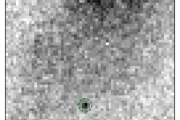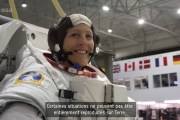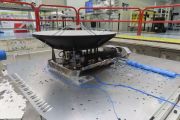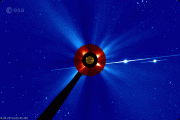
Copernical Team
Gogo LEO broadband service powers ahead
 Gogo Business Aviation's (NASDAQ: GOGO) global Low Earth Orbit (LEO) broadband service has gained momentum with significant program achievements by Gogo and strategic partners, OneWeb and Hughes Network Systems, LLC, an EchoStar (NASDAQ: SATS) Company.
Gogo's LEO satellite network provider, OneWeb, completed the launch of its LEO constellation with more than 588 satellites in orbit at the
Gogo Business Aviation's (NASDAQ: GOGO) global Low Earth Orbit (LEO) broadband service has gained momentum with significant program achievements by Gogo and strategic partners, OneWeb and Hughes Network Systems, LLC, an EchoStar (NASDAQ: SATS) Company.
Gogo's LEO satellite network provider, OneWeb, completed the launch of its LEO constellation with more than 588 satellites in orbit at the BlackGEM telescopes begin hunt for gravitational-wave sources at La Silla
 The BlackGEM array, consisting of three new telescopes located at ESO's La Silla Observatory, has begun operations. The telescopes will scan the southern sky to hunt down the cosmic events that produce gravitational waves, such as the mergers of neutron stars and black holes.
Some cataclysmic events in the Universe, such as the collision of black holes or neutron stars, create gravitationa
The BlackGEM array, consisting of three new telescopes located at ESO's La Silla Observatory, has begun operations. The telescopes will scan the southern sky to hunt down the cosmic events that produce gravitational waves, such as the mergers of neutron stars and black holes.
Some cataclysmic events in the Universe, such as the collision of black holes or neutron stars, create gravitationa NASA completes heart of Roman Space Telescope's primary instrument
 The heart of NASA's Nancy Grace Roman Space Telescope was recently delivered to Ball Aerospace in Boulder, Colorado, for integration into the WFI (Wide Field Instrument). Called the FPS (Focal Plane System), it serves as the core of Roman's camera. When the mission launches by May 2027, astronomers will use this system to gather exquisite images to help unravel the secrets of dark energy and dar
The heart of NASA's Nancy Grace Roman Space Telescope was recently delivered to Ball Aerospace in Boulder, Colorado, for integration into the WFI (Wide Field Instrument). Called the FPS (Focal Plane System), it serves as the core of Roman's camera. When the mission launches by May 2027, astronomers will use this system to gather exquisite images to help unravel the secrets of dark energy and dar Temperature of solar flares helps understand nature of solar plasma
 The Sun's rotation produces changes in its magnetic field, which flips completely every 11 years or so, triggering a phase of intense activity. Solar flares - huge eruptions from the surface of the Sun lasting minutes or hours - emit intense bursts of particles and high levels of electromagnetic radiation. The release of energy during solar flares heats the chromosphere, causing almost full ioni
The Sun's rotation produces changes in its magnetic field, which flips completely every 11 years or so, triggering a phase of intense activity. Solar flares - huge eruptions from the surface of the Sun lasting minutes or hours - emit intense bursts of particles and high levels of electromagnetic radiation. The release of energy during solar flares heats the chromosphere, causing almost full ioni OU space scientists provide new insight into the evolution of Mars' atmosphere
 Scientists at The Open University (OU) have analysed isotopic measurements in the atmosphere of Mars, providing new information on the evolution of the Martian climate throughout history and the origin of surface organics on Mars.
The atmosphere of Mars, which is mostly made of carbon dioxide (CO2), is relatively enriched in 'heavy' carbon (13C) with respect to Earth due to the preferentia
Scientists at The Open University (OU) have analysed isotopic measurements in the atmosphere of Mars, providing new information on the evolution of the Martian climate throughout history and the origin of surface organics on Mars.
The atmosphere of Mars, which is mostly made of carbon dioxide (CO2), is relatively enriched in 'heavy' carbon (13C) with respect to Earth due to the preferentia A blancing act at Ubajara: Sol 3830
 We are in the midst of our 38th successful drill campaign, analyzing the "Ubajara" bedrock, a sample of what we have been referring to as the "above Marker band" bedrock. Curiosity has been systematically analyzing the bedrock and associated vein and nodular features for chemistry, texture and sedimentology since we left the Marker band and our last drill target, "Tapo Caparo."
We are inte
We are in the midst of our 38th successful drill campaign, analyzing the "Ubajara" bedrock, a sample of what we have been referring to as the "above Marker band" bedrock. Curiosity has been systematically analyzing the bedrock and associated vein and nodular features for chemistry, texture and sedimentology since we left the Marker band and our last drill target, "Tapo Caparo."
We are inte Lunar Flashlight to fly by Earth
 With its primary mission over, the CubeSat will zoom by Earth late Tuesday, May 16, and NASA's Eyes on the Solar System app will track it, providing a chance to say farewell.
NASA's Lunar Flashlight mission to the Moon has ended, but the briefcase-size spacecraft will soon fly past Earth before heading into deep space. On Tuesday, May 16, at 9:44 p.m. PDT (Wednesday, May 17, at 12:44 a.m.
With its primary mission over, the CubeSat will zoom by Earth late Tuesday, May 16, and NASA's Eyes on the Solar System app will track it, providing a chance to say farewell.
NASA's Lunar Flashlight mission to the Moon has ended, but the briefcase-size spacecraft will soon fly past Earth before heading into deep space. On Tuesday, May 16, at 9:44 p.m. PDT (Wednesday, May 17, at 12:44 a.m. China continues testing its 130-ton reusable liquid oxygen kerosene engine
 China's National Space Agency has announced a significant achievement in the country's space propulsion development. The Xi'an Aerospace Propulsion Research Institute, known for its independent research and design capabilities, has successfully initiated two test runs of the 130-ton reusable liquid oxygen kerosene afterburning cycle engine. This milestone was achieved on the Tongchuan high-thrus
China's National Space Agency has announced a significant achievement in the country's space propulsion development. The Xi'an Aerospace Propulsion Research Institute, known for its independent research and design capabilities, has successfully initiated two test runs of the 130-ton reusable liquid oxygen kerosene afterburning cycle engine. This milestone was achieved on the Tongchuan high-thrus Ax-2 crew carrying personal, cultural mementoes on launch to ISS
 The second crew of astronauts set to launch on a totally private space mission said Tuesday they feel inspired by the responsibility and significance of their flight.
The four-member Axiom Space crew is scheduled to lift off at 5:37 p.m. EDT Sunday from Kennedy Space Center in Florida. They'll travel in a SpaceX Crew Dragon capsule on a mission that includes eight days aboard the Intern
The second crew of astronauts set to launch on a totally private space mission said Tuesday they feel inspired by the responsibility and significance of their flight.
The four-member Axiom Space crew is scheduled to lift off at 5:37 p.m. EDT Sunday from Kennedy Space Center in Florida. They'll travel in a SpaceX Crew Dragon capsule on a mission that includes eight days aboard the Intern Tomorrow.io paves way for new global weather forecasting service
 The Tomorrow Companies Inc., the world's leading weather intelligence platform, has announced successful on-orbit operation of its first satellite, Tomorrow-R1. Launched on April 14th, Tomorrow-R1 is the world's first commercially built weather-radar satellite.
It is orbiting at 500 km above Earth in a polar orbit, and carrying a Ka-band radar ideally suited for detecting precipitation and
The Tomorrow Companies Inc., the world's leading weather intelligence platform, has announced successful on-orbit operation of its first satellite, Tomorrow-R1. Launched on April 14th, Tomorrow-R1 is the world's first commercially built weather-radar satellite.
It is orbiting at 500 km above Earth in a polar orbit, and carrying a Ka-band radar ideally suited for detecting precipitation and 



































